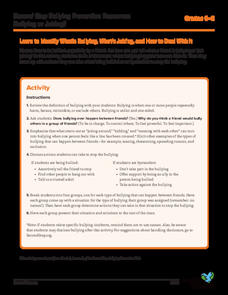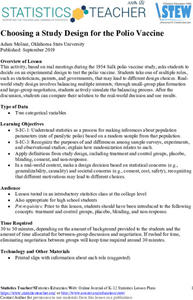Maryland Department of Education
The Concept of Diversity in World Literature Lesson 12: Author's Purpose - Yeats and Achebe
Is there such a thing as fate/luck? Can one fight destiny? As part of their study of Chinua Achebe's purpose in writing Things Fall Apart, class members answer these questions from Achebe's point of view and then from William Butler...
EngageNY
Grade 9 ELA Module 1: Unit 3, Lesson 11
The study of Romeo and Juliet continues as pairs use the provided summary tool worksheet to record evidence of how Shakespeare uses dramatic irony to heighten the tension in Juliet's soliloquy in Act 3, scene 2, lines 1–31.
EngageNY
Definition and Properties of Volume
Lead a discussion on the similarities between the properties of area and the properties of volume. Using upper and lower approximations, pupils arrive at the formula for the volume of a general cylinder.
Gobal Oneness Project
A Tapestry of Multicultural Diversity
New York City is a perfect place to begin a study of multicultural diversity. The largest and the most culturally diverse city in the United States provides the backdrop for a photo essay that features images of cultural and religious...
Global Oneness Project
Witnessing Icebergs
Camille Seaman's photoessay, "Witnessing Icebergs" documents just a tip of the problem of climate change through images of icebergs in both the Arctic and Antarctic polar regions. After viewing the haunting images, viewers respond to a...
EngageNY
When Can We Reverse a Transformation? 2
The second lesson on finding inverse matrices asks class members to look for a pattern in the inverse matrix and test it to see if it works for all matrices. The teacher leads a discussion to refine the process in finding inverses, then...
Facing History and Ourselves
How Should We Remember?
We must remember the past in order to avoid its mistakes. Young historians analyze the importance of historical remembrance using primary and secondary documents, as well as video clips. They then study the creation of a World War II...
Amnesty International
Respect My Rights, Respect My Dignity Module Three – Sexual and Reproductive Rights Are Human Rights
Give learners the support they need to take action in their communities when it comes to sexual and reproductive rights. A resource teaches the class about global issues surrounding gender inequality, including both readings and...
Space Awareness
Day and Night in the World
How do different parts of the world experience day and night? Introduce scholars to the concept of global citizenship while teaching about animal behavior with discussion of nocturnal and diurnal animals. Then, learners complete...
Acoustical Society of America
Sound Measures
How loud is the class's hearing threshold? Using a sound level meter, the class members observe how the loudness of sound is affected by distance. Learners continue to study decibels by seeing how different sounds compare to each other...
PBS
Out of the Shadows | Black America Since MLK: And Still I Rise
Two powerful video clips launch a study of race relations in the United States after the Selma, Alabama riots, the passage of the Votings Rights Act, and the riots in Watts, California.
Smithsonian Institution
Weather Widget
What's so difficult about predicting the weather? Scholars work collaboratively to build a device that models how meteorologists use computers to forecast weather. Team members collect and interpret data while working together to...
Overcoming Obstacles
Learning How You Learn Best
Scholars think of a special place, then represent that place through pictures or written words— a poem, song, or short story. Peers show off their organizational skills by reviewing their binders and notebooks, comparing strategies, and...
Random House
Mapping Skills
Spark interest and enhance your pupils' map skills using Matteo Pericoli's book, See the City: the Journey of Manhattan Unfurled. Through Pericoli's illustrations and text, learners explore the East and West side of Manhattan. Then,...
Curated OER
Purchasing Skills
After a videotaped training session, individuals with special needs practice purchasing skills. They view the video, discuss what the person in the video is doing, and then practice purchasing an item at a real store. The video session...
CTC Publishing
Interrupting
Everybody loves to contribute to the conversation, but it needs to be done politely so as not to interrupt. Help your little ones learn how to add to a conversation appropriately with a few activities that complement the book, My Mouth...
Houghton Mifflin Harcourt
Home Sweet Home: English Language Development Lessons (Theme 5)
Through grand discussion, picture cards, and poems, enhance language proficiency with a Home Sweet Home themed unit created to support English language development. Each lesson follows a listen, speak, move, and/or look routine that...
Social Skills Central
Photo Cartoons: Being Polite
Have you ever been left out of plans your friends were discussing? This photo cartoon will help your learners recognize that being polite can go beyond just saying please and thank you by making sure others feel included and welcomed.
National Research Center for Career and Technical Education
Break-Even Point
How do companies determine the prices of their products? Marketing maestros discover the concepts of cost and break-even point through discussion, independent practice, and a collaborative assessment. The career and technology-oriented...
Committee for Children
Learn to Identify What’s Bullying, What’s Joking, and How to Deal With It
A quick lesson takes a look at the differences between bullying and joking. Through whole-class discussion, scholars identify between the two behaviors and brainstorm actions to take to cease bullying behavior. Small groups share with...
Health Smart Virginia
Making Partners
Partnering with someone new may be daunting. Here a lesson encourages young peers to work collaboratively in physical activity settings. Following a whole-class discussion, scholars participate in several cooperative activities that...
American Statistical Association
Choosing a Study Design for the Polio Vaccine
Be on the right side of history. Scholars first learn about polio and the meetings of the 1954 Salk polio vaccine study. In groups, they select roles, such as parents, government officials, and statisticians, and decide on the best...
Curated OER
Laundromat Skills
The worst part of the week is trying to scrounge quarters for the laundromat. Make the task of cleaning laundry an easy one for your high-functioning special needs learners. You take a trip to a local laundromat to practice using coin...
Learning for Life
Overcoming Poor Decisions
Help your learners develop the ability to recognize poor decisions, make necessary changes, and learn valuable lessons from their mistakes through scenario analysis and discussion with their peers.
Other popular searches
- Group Discussions
- Titanic Group Discussion
- Group Discussion Format
- Whole Group Discussion
- Small Group Discussions
- Group Discussion Activities
- Brief Group Discussion
- Short Group Discussion
- Chapter 6 Group Discussion
- Topics Group Discussions
- Business Group Discussions
- Brief Group Discussion Topic

























